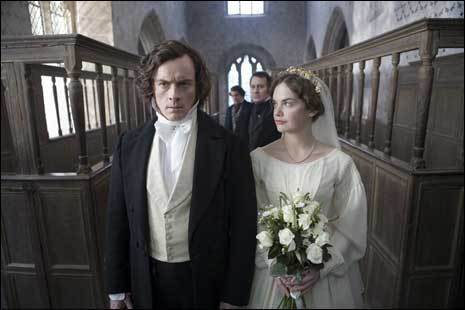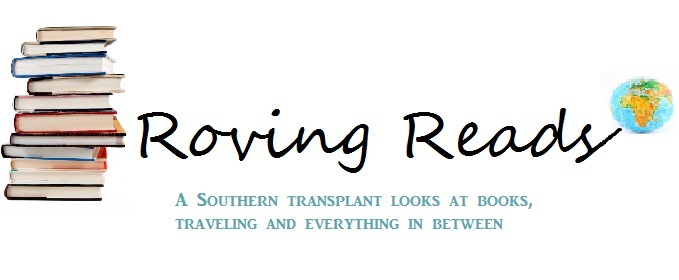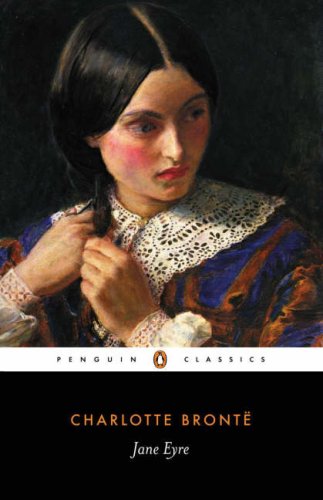When the credits rolled at the end of a sold-out showing of Jane Eyre this past weekend, my friend and I turned to each other and said "huh." I think we were both torn between loving the movie and feeling vaguely let down by it. First and foremost, Mia Wasikowska is fantastic as Jane. I've seen 2 other adaptions (the 2006 version with Ruth Wilson and the 1943 version with Joan Fontaine), and Wasikowska's portrayal is by far my favorite. She perfectly embodies the strong will and spirit that hides beneath the plain (OK, plain for an actress in a big budget movie) exterior. The exchange between Jane and Rochester when he calls her into the drawing room on his return to Thornfield ("do you think me handsome?" "no, sir.") crackles with energy and you can see his regard for her growing as she speaks with him.
I also found Michael Fassbender's Rochester to be wonderfully complex. Yes, he is enigmatic and often harsh (I've never liked in the book and movie how he openly dislikes Adele), but there is a tenderness here that makes him more human than other versions of the character. When Bertha flies at him he restrains her almost compassionately, and it is a testament to Fassbender's acting that he conveys how Rochester despises Bertha and his awful mistake in marrying her but cannot act cruelly towards her. In the scene where Rochester tries to convince Jane to stay with him after their failed wedding you can sense his anguish and the almost herculean strength she needs to overcome his offer.
The cinematography work by Adriano Goldman is stunning. Thornfield Hall comes alive, both in the dreariness of winter and the lightness of spring and summer, and I really got a feel of what it might be like to live a monotonous life in an isolated mansion with only an older woman and child for company. This version definitely amps up the gothic elements and the creepiness of the house and is well-served by strong supporting characters (Jamie Bell as St. John Rivers and the fabulous Judi Dench as Mrs. Fairfax are the two obvious standouts, but Sally Hawkins is also wonderfully icy as Mrs. Reed).
So why didn't I absolutely love it? Obviously, trying to condense a 500-page book into 115 minutes on screen means that certain parts of the story will be edited out, but I was puzzled by the scenes that were omitted. The most glaring one was leaving out that Jane and the Rivers siblings are cousins. Instead, Jane gives away 3/4 of her inheritance due to their kindness in taking her in (at least that's what I assumed, as it never was really explained). Also, while there is a tender scene with Jane returning to the remains of Thornfield and the now-blinded Rochester, there is no epilogue to show that they married and he eventually regained sight in one eye. I think if I hadn't read and enjoyed the book so much, I would have absolutely adored this movie. As such I enjoyed it immensely but felt it couldn't measure up to the powerful and affecting emotion of Bronte's original story.
Monday, March 14, 2011
Tuesday, March 8, 2011
Jane Eyre Featurette
Sorry if it feels a bit like Jane Eyre week at Roving Reads, but I am ridiculously excited for the new movie, starring Mia Wasikowska and Michael Fassbender, which releases in my area this weekend. I found this featurette on the making of the movie on Focus Features' website, complete with interviews with Mia and Michael and a few new images from the film.
Monday, March 7, 2011
Jane Eyre by Charlotte Bronte
I finally finished Jane Eyre this weekend, and absolutely loved it! It is a wonderfully romantic novel that also deals with weighty issues like faith, sin, and death. The story is so well-known that there's no need for a review, but I thought I'd touch on some of my favorite themes or moments in the book (note: this post contains some mild spoilers, so if you haven't read the book or don't want to know the story stop now!)
- Jane is in some ways a thoroughly modern heroine, able to take care of herself and remain upright through enormous hardships. She gives freely of forgiveness and love though she has been shown few of those mercies herself, and she knows her own mind and isn't swayed by stronger personalities. When Rochester tries to persuade Jane to live with him as his mistress, she is sorely tempted but knows the pleasure of giving in would not outweigh the consequences:
- Neither Jane or Rochester are conventionally attractive, but in the other's eyes they are beautiful. She tenderly cares for him when he loses his sight, and he in turns adores her. Don't we all long to be judged more for our inner selves than for outward appearances? As Mary says on hearing that Rochester and Jane were married, “she'll happen do better for him nor any o’ t’ grand ladies.” And again, “If she ben't one o’ th’ handsomest, she's noan faâl and varry good-natured; and i’ his een she's fair beautiful, onybody may see that.”
Over the weekend I watched the 2006 Masterpiece adaption with Toby Stephens as Rochester and Ruth Wilson as Jane. For the most part I really enjoyed it, though I wondered at several of the plot changes that seemed unnecessary (instead of dressing as the gypsy fortune-teller, Rochester pays a real one to entertain/question the ladies, St. John finds Jane on the moor instead of her collapsing outside Moor House, Jane has no knowledge of Rochester's injuries before she arrives at Ferndean). I can't wait for the new adaption, starring Mia Wasikowska and Michael Fassbender, which from the looks of the trailer below seems to play up the gothic aspects of the story.
source: personal copy. This book was one of my selections for Subtle Melodrama's 2011 Victorian Literature Reading Challenge.
- Jane is in some ways a thoroughly modern heroine, able to take care of herself and remain upright through enormous hardships. She gives freely of forgiveness and love though she has been shown few of those mercies herself, and she knows her own mind and isn't swayed by stronger personalities. When Rochester tries to persuade Jane to live with him as his mistress, she is sorely tempted but knows the pleasure of giving in would not outweigh the consequences:
"...while he spoke, my very conscience and reason turned traitors against me, and charged me with crime in resisting him. They spoke almost as loud as Feeling; and that clamored wildly. “Oh, comply!” it said. “Think of his misery; think of his danger—look at his state when left alone; remember his headlong nature; consider the recklessness following on despair—soothe him; save him; love him; tell him you love him, and will be his. Who in the world cares for you? or who will be injured by what you do?”
Still indomitable was the reply—“I care for myself. The more solitary the more friendless, the more unsustained I am, the more I will respect myself. I will keep the law given by God; sanctioned by man. I will hold to the principles received by me when I was sane, and not mad—as I am now. Laws and principles are not for the times when there is no temptation: they are for such moments as this, when body and soul rise in mutiny against their rigor; stringent are they; inviolate they shall be. If at my individual convenience I might break them, what would be their worth?"
- I enjoyed the multi-layed presentation of Christians and faith. There are examples of people who are esteemed as Christians but really have none of the qualities, like Mr. Brocklehurst. St. John has the fire and the passion to do great things for God, but he expects perfection out of himself and others and isn't able to temper his expectations with compassion. Jane clings to the law of God as she resists Mr. Rochester in the above passage and realizes she has made him the center of her universe: "I could not, in those days, see God for his creature of whom I had made an idol."
- Neither Jane or Rochester are conventionally attractive, but in the other's eyes they are beautiful. She tenderly cares for him when he loses his sight, and he in turns adores her. Don't we all long to be judged more for our inner selves than for outward appearances? As Mary says on hearing that Rochester and Jane were married, “she'll happen do better for him nor any o’ t’ grand ladies.” And again, “If she ben't one o’ th’ handsomest, she's noan faâl and varry good-natured; and i’ his een she's fair beautiful, onybody may see that.”
 |
| Rochester (Toby Stephens) and Jane (Ruth Wilson) |
source: personal copy. This book was one of my selections for Subtle Melodrama's 2011 Victorian Literature Reading Challenge.
It's Monday-What Are You Reading?
It's Monday, What Are You Reading? is a fun weekly meme hosted by Sheila at Book Journey. This is where we share what we've read the previous week and what we're planning to read this week. It's a great way to see what others are reading (and add more books to the TBR pile!)
It's been a while since I've participated in this meme (unfortunately I haven't had much time to read lately) but I'm glad to be back this week!
Finished Last Week:
Jane Eyre by Charlotte Bronte. Though the novel started off slowly for me I quickly became caught up in the story of Jane and her mysterious employer Edward Fairfax Rochester. I'm eagerly waiting for the movie coming out next week! This was one of my selections for the Victorian Literature Challenge at Subtle Melodrama-review/wrap-up post to come.
Currently Reading:
Delta Wedding by Eudora Welty. Welty's writing is so descriptive and evocative of the Mississippi Delta during the 1920s: "Grass softly touched her legs and her garter rosettes, growing sweet and springy for this was the country. On the narrow little walk along the front of the house, hung over with closing lemon lilies, there was a quieting and vanishing of sound. It was not yet dark. The sky was the color of violets, and the snow-white moon in the sky had not yet begun to shine (p.6)."
Up Next:


Scaramouche (thanks for the suggestion Ruth!) or Paris to the Moon by Adam Gopnik to start getting excited about my trip to France!
Subscribe to:
Comments (Atom)







